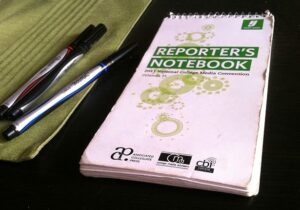One of the many joys of working as a journalist — and I had too many of them to count — was being given the chance to tell young people about the challenges of my craft.
Those opportunities came in the form of “career day” events at local schools. Whether in Oregon or in Texas, there was a time when educators thought enough of journalists and journalism to invite us into their classrooms to talk to students about career potential and what it takes to do what we did.
Over many years standing in front of students, I eventually developed a sort of pre-determined formal introduction. I usually would begin by telling students that “I have the best job in town. I get to report on our community and I get to foist my opinion on thousands of newspaper readers every day.”
I’d get a chuckle out of the students. Perhaps from their teachers, too.
I don’t know these days, given the pummeling that newspapers are taking in the current media market, what print journalists are telling students. I suspect it has something to do with the myriad pressures being exerted on newspapers, how they’re having to compete with the Internet, cable TV and assorted other media outlets.
One particular career day stands out among all the times I got to speak to students. I want to share it with you.
It was in 1983. I was working as editor of a small afternoon daily, The Enterprise-Courier, in Oregon City, Ore. My phone rang one day and on the other end was a gentleman named John Eide, who was the shop teacher at Harvey W. Scott Elementary School in Portland, where I attended as a boy. Mr. Eide invited me back to Harvey Scott School to give a career day presentation.
I hadn’t darkened the door at that school for 20-plus years. For this gentleman to call me and invite me back was a singular honor. It blew my mind.
So, I went back to Harvey Scott School for the day. I walked into the office and got reacquainted with my fifth-grade shop teacher. He then took me to Carl Hendricksen’s classroom. Mr. Hendricksen happened to be my sixth-grade teacher back in the day. To see him, with his hair turned snowy white, absolutely knocked me out!
I spent the day there, talking to students about newspapers, telling them about the challenges I faced each day publishing a newspaper that competed with the then-mighty Portland Oregonian.
Arguably, the highlight of the visit was walking into the school cafeteria. Perhaps others have experienced the same thing. This was a first for me: The cafeteria smelled precisely as I remembered it two decades earlier. It was as if I walked through a time portal and stood in a sort of parallel universe.
Career days such as that one routinely offered me the chance to share the joys and challenges of a career I was privileged to pursue. I hope my successors in the business are able to speak with as much enthusiasm about journalism as I did.


